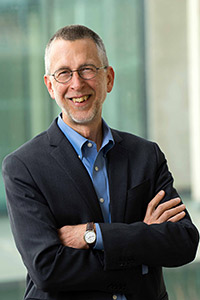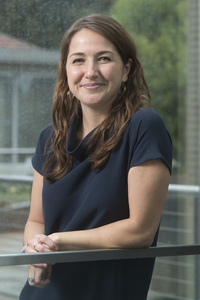
By Andrew Cohen
Two Berkeley Law research centers recently welcomed new executive directors. Jim Dempsey now heads the Berkeley Center for Law & Technology (BCLT), and Jordan Diamond ’08 has returned to campus to lead the Center for Law, Energy & the Environment (CLEE).
“BCLT has long been the leading center for research, education, and convening on key issues affecting the future of the Internet.” Dempsey said. “The faculty directors comprise some of the world’s leading scholars on intellectual property and privacy. The ability to work with them, at a time when so many tech policy issues are developing so rapidly, was very attractive. I have so many existing relationships with BCLT and Berkeley in general that this felt like home to me before even starting.”
Dempsey has long collaborated with BCLT Faculty Directors Deirdre Mulligan, Pamela Samuelson, and Paul Schwartz, as well as Chris Hoofnagle, the center’s director of information privacy programs. Their projects have tackled comparing surveillance laws internationally and ramping up smart grid privacy in California, among others.
A leading expert on privacy and Internet policy for three decades, Dempsey spent 18 years with the Center for Democracy and Technology, a nonprofit headquartered in Washington, D.C., and served as its executive director from 2003 to 2005. He led the center’s Global Internet Policy Initiative, which worked with government officials, industry, and human rights organizations on Internet policy issues in developing and transitional countries.
At BCLT, Dempsey aims to “preserve our leadership position on intellectual property and privacy, expand our leadership into other areas, and deepen our engagement internationally.” Areas the center may pursue more actively include those relating to free expression, cybersecurity, Internet governance, and policy issues that affect the life sciences.
Dempsey is also eager to tap the wide-ranging talents of Berkeley Law’s student body. “The role of students is paramount,” he said. “Regardless of the paths they take, they’ll almost certainly encounter issues involving technology…I’m hoping to foster career-long relationships between students and BCLT.”
Having testified more than 30 times before Congressional committees, Dempsey is regularly identified as one of the nation’s top leaders in technology policy. In 2012, the U.S. Senate confirmed him as a part-time member of the Privacy and Civil Liberties Oversight Board, an independent federal agency charged with overseeing the nation’s counterterrorism programs.
From 1985 to 1995, Dempsey was assistant counsel to the House Judiciary Committee’s Subcommittee on Civil and Constitutional Rights. There, he worked on issues at the intersection of national security and constitutional rights such as terrorism, counter-intelligence, and electronic surveillance laws.
“I’ve been fortunate in my career to work with policy leaders in government, in the nonprofit advocacy community, and at the leading tech companies,” Dempsey said. “As news of my taking this job has gotten around, I’ve received many messages from friends at companies and law firms saying ‘we have a great relationship with BCLT.’ I’m excited to enhance those relationships.”
Back in Berkeley
For Diamond, the chance to spearhead CLEE’s far-reaching initiatives meshed seamlessly with her past experience and future goals. Raised in picturesque Mendocino, California—walking distance to the ocean with redwood forest views from her bedroom window—environmental preservation has long been part of her DNA.

“I grew up in a community where the general ethos was that natural resources are finite and should be respected,” Diamond said. “In order to be good stewards of those resources, our decisions must be based on robust information about the resource and about people’s needs and priorities. That’s central to CLEE, making sure that the best available information—legal, economic, scientific—is informing our policies and, once they’re on the books, informing how best to implement them in a meaningful way.”
Diamond graduated from Berkeley Law with a certificate in environmental law and was managing editor of the school’s Ecology Law Quarterly. For the past six years, she worked at the Environmental Law Institute (ELI), a non-partisan research and education center.
Most recently, she co-directed the institute’s Ocean Program, working to strengthen environmental ocean and coastal governance. Diamond has also served as the academic coordinator for UC Berkeley’s Law of the Sea Institute, and in 2013 received a Distinguished Environmental Advocates: Next Generation Award from the American Bar Association Section of Environment, Energy, and Resources.
At ELI, many of her projects focused on increasing the role of affected communities in the environmental governance systems affecting resources on which they depend. This included supporting Alaska Natives in the area’s Arctic offshore resource management and ensuring similar involvement during Deepwater Horizon restoration—following the BP oil spill—from those who make their livelihood in the Gulf of Mexico.
Diamond said part of her excitement about joining CLEE stems from its collaborative approach to problem-solving. The center works across disciplines to analyze environmental and energy problems, and brings together members of the government, business, and nonprofit sectors to help develop solutions.
“Successfully tackling environmental issues requires an interdisciplinary approach,” Diamond said. “You can’t analyze these issues purely from a legal or scientific perspective. One of CLEE’s great assets is our access not only to incredible environmental faculty, staff, and students here at the law school, but also at all the other colleges across campus.”
The center’s research and education programs confront issues such as climate change and energy, water quality and scarcity, and sustainable communities. Its goal is to be responsive to rapidly changing needs.
“One of things I most admire about CLEE is its track record of delivering impact-oriented research,” Diamond said. “The projects are designed to tackle specific problems and find practical solutions. It’s exciting to be part of California’s push to become an environmental policy leader and model for other states.”